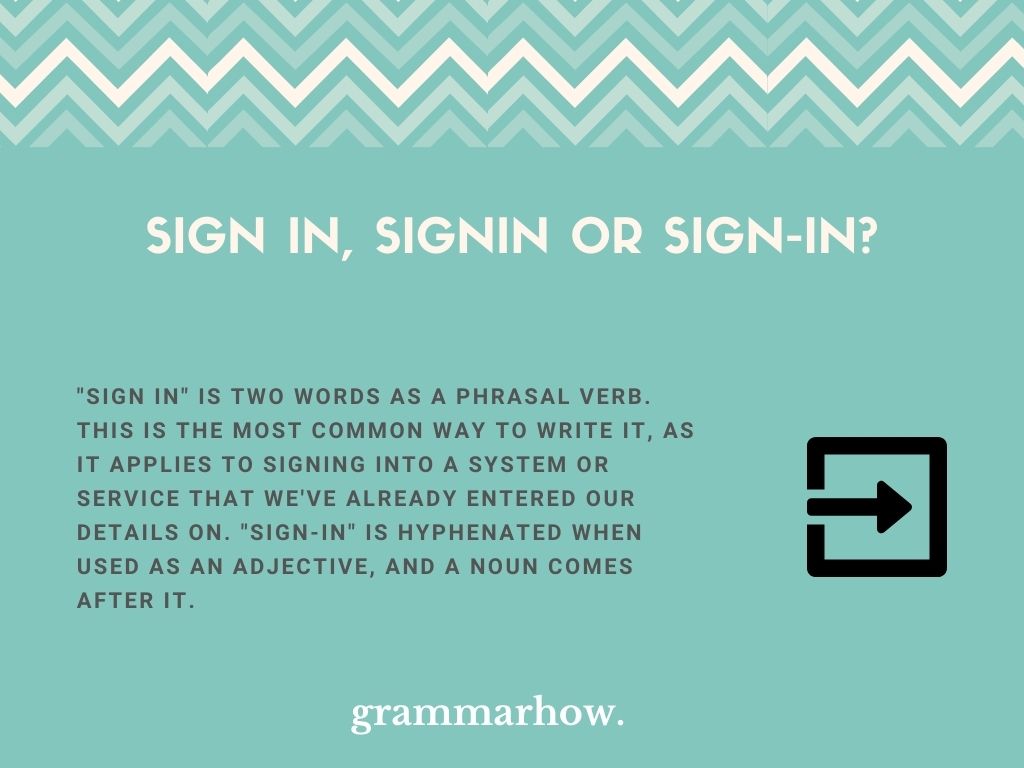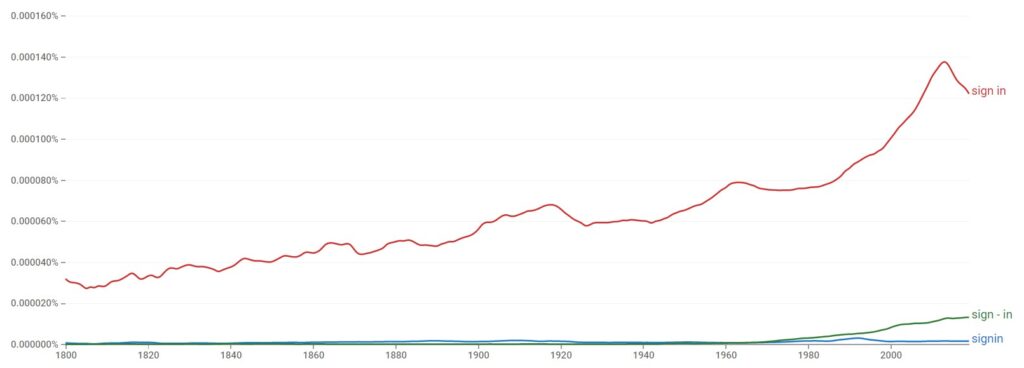“Sign in” is a common phrase these days. It’s common for websites to require it, so it’s likely that you’ve already come across it yourself. This article will explore whether it’s one or two words. It’s seemingly hyphenated in some cases, so let’s take a look.
Sign in vs. Sign-in vs. Signin
“Sign in” is two words as a phrasal verb. This is the most common way to write it, as it applies to signing into a system or service that we’ve already entered our details on. “Sign-in” is hyphenated when used as an adjective, and a noun comes after it.

According to Google Ngram Viewer, “sign in” is by far the most popular choice of the three. This shows that the phrasal verb form is the most common option. “Sign-in” sees some usage, while “signin” as one word is never used.

The Cambridge Dictionary and The Oxford Dictionary both provide definitions for “sign in.” They both mention that it’s a phrasal verb, and we use it whenever we enter our data into a system.
You might also be interested in seeing the differences between verbs and adjectives from the following examples:
- Verb: I need to sign in.
- Adjective: Those are my sign-in details.
Is “Signin” One Word?
“Signin” is never correct. You should not write it as one word because there is never a reason to remove the space (or hyphen) from either form. This just turns it into a difficult-to-read word, and it makes no sense. It does not aid the reader with comprehension.
Here’s how it works:
- Correct: I’m not going to be able to sign in for ages. You’ll have to let me know what’s going on with the site.
- Incorrect: I can’t signin either! I wonder whether the servers have gone down or what might have happened.
- Correct: Multiple sign-in attempts have been used on this computer, so you’ll have to try a different one while it’s locked out.
- Incorrect: I didn’t know the signin details, so they locked me out!
Is “Sign in” Two Words?
“Sign in” is best at two words. It’s the most common way to write it, and it’s likely that you’ve come across it in this form on many social media sites. You are required to “sign in” before you can use them, so you’ve probably already seen it.
These examples should help you with it:
- If you could sign in quickly, that would be great. We don’t have time to waste right now.
- I’m not going to sign in with you standing right there! What if you see my password?
- Is she signed in? I thought I saw her name pop up, but I’m not sure why she hasn’t messaged me.
- You should sign in quickly. There’s a whole event going on, and I don’t want you to miss out on the cool stuff!
Is “Sign-in” Hyphenated?
“Sign-in” is hyphenated when a noun comes directly after it. In this form, it’s an adjective, and we can refer to AP Style rules to teach us that hyphens allow us to create compound adjectives. The phrasal verb form can be condensed into one word to modify another noun.
The AP Stylebook uses hyphens as linkers between common words. If those words all modify the same noun (i.e. “sign-in attempt”), then it makes sense to group them with a hyphen.
Here are some more examples to show you how it looks:
- That sign-in attempt is invalid, so you’ll have to make sure you’ve spelled it all right before trying again.
- Multiple sign-in failures have been spotted with this account. Are you sure you want to keep going with this?
- I’m not sure what my sign-in details are anymore. I’m sure I wrote them down somewhere.
- I have a sign-in sheet that might be useful for this situation. It’ll be able to track everyone’s whereabouts!
Is “In” Capitalized In The Word “Sign-In”?
“Sign-in” is treated as one word when it’s hyphenated. Therefore, you do not need to capitalize the second part of the hyphen when starting a sentence with it. Only “sign” needs a capital letter.
The only exception to this rule comes when writing “sign-in” as part of a title. If you capitalize all the words in your title, you should also capitalize both sections of the hyphen form. While the hyphen treats “sign-in” as one word, it’s still better to write “Sign-In” to keep it more professional.
You may also like:
Sign Up vs. Sign In vs. Log In: Difference Explained (+Quiz)
Pickup, Pick up, or Pick-up? (Helpful Examples)
